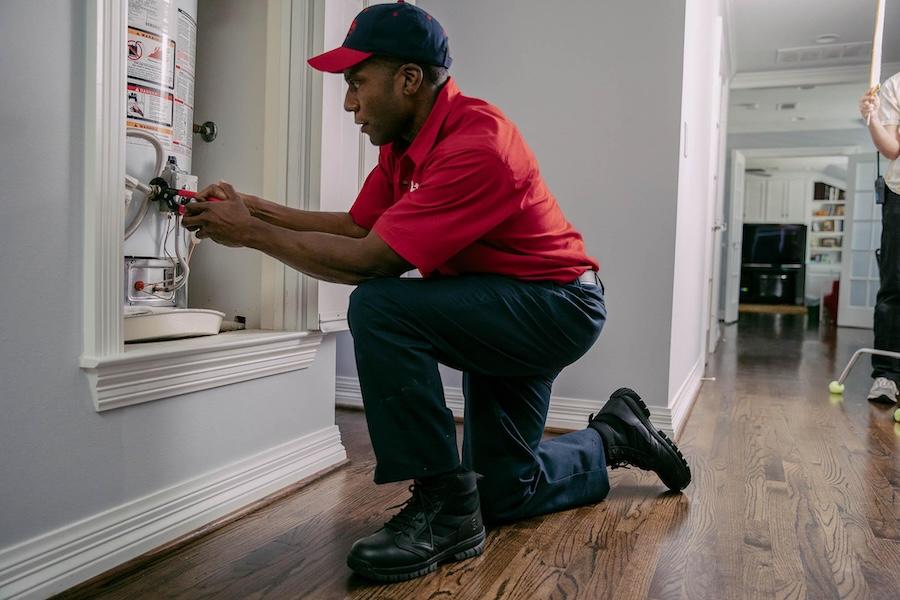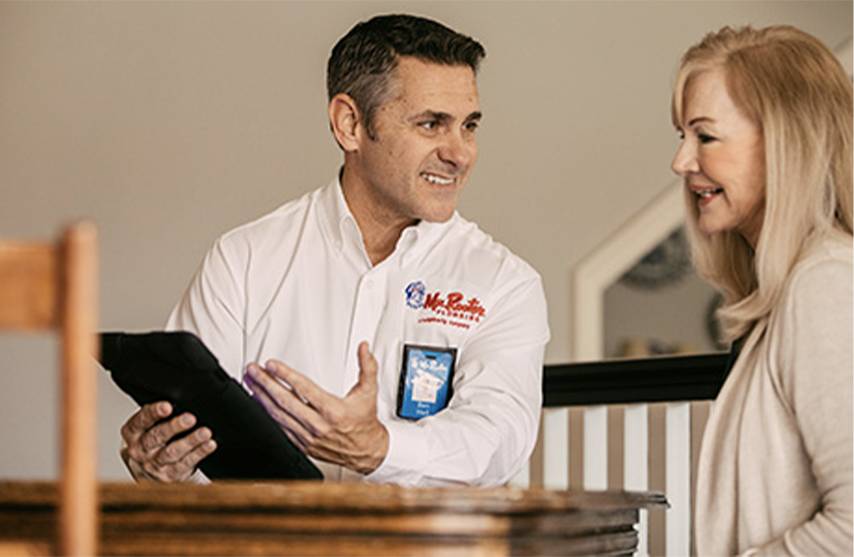October 26,2025 The Real Lifespan of a Water Heater — and What Shortens It
A hot shower is a small luxury you don’t think twice about until the water turns cold. Most people assume their water heater will keep working year after year, but every tank has a limit. Understanding how long it’s built to last and what shortens that lifespan can save you from an unexpected cold surprise and a major bill. At Mr. Rooter Plumbing, we’ve seen how simple habits and early care can make the difference between steady performance and a breakdown. Let’s take a closer look so you’ll know what to expect and when it’s time to plan ahead.
How Long a Water Heater Really Lasts
Most standard tank-style water heaters last about 8 to 12 years. That number varies depending on the model, the water quality in your area, and how well the unit is maintained. Some systems manage 15 years, while others start to fail in half that time. Gas water heaters tend to have a shorter lifespan because their combustion process creates more heat stress on the tank. Electric units usually last a bit longer since they operate at a steadier temperature. Tankless water heaters can reach up to 20 years of use, though they require regular descaling to stay efficient. Even the most durable unit won’t last forever. Minerals and pressure wear down the tank. Heat cycles expand and contract the metal. The anode rod that protects the tank from rust eventually dissolves. Once corrosion starts, the decline moves quickly.
The Hidden Factors That Shorten Lifespan
Every water heater faces wear and tear, but some conditions speed up the process. Knowing what these are can help you extend the unit’s life and avoid premature failure.
- Hard Water: Mineral buildup is one of the biggest threats to your water heater. Calcium and magnesium in hard water settle inside the tank and on the heating elements. The sediment insulates the water from the heat source and forces the unit to work harder. Flushing the tank once or twice a year can help remove buildup.
- Poor Maintenance: A water heater that’s never flushed or inspected has a shorter life. Routine maintenance clears out sediment, checks the anode rod, and makes sure the temperature and pressure relief valve work properly. A plumber in Champion Township can perform a full inspection and maintenance service.
- Incorrect Temperature Settings: Many homeowners set their thermostat too high. Water that stays above 140°F accelerates corrosion and mineral buildup. It also wastes energy. The ideal setting is usually around 120°F.
- Poor Water Pressure: High water pressure might feel great in the shower, but it strains the tank and joints inside your water heater. The stress can cause leaks and fractures. Installing a pressure-reducing valve helps regulate flow and protect the system.
- Corrosive Environment: If your water heater is in a damp or poorly ventilated area, it’s more likely to rust from the outside in. Basements, garages, and crawl spaces can expose tanks to moisture or chemical fumes that eat away at the metal. Keeping the area dry and clean helps slow the process.
Warning Signs That It’s Near the End
You can usually spot the signs of decline before your water heater fails completely. Watch for these red flags so you can plan a water heater replacement before you lose hot water.
- Discolored or Rusty Water: If the water starts to look cloudy or orange, the inside of the tank may be corroding. This usually means the anode rod is spent, and the lining is breaking down.
- Rumbling or Popping Noises: Sediment buildup can cause loud cracking sounds when the heater cycles on. That’s the layer of minerals shifting under heat, and it’s a sign the system needs to be flushed.
- Inconsistent Water Temperature: If the water swings between hot and cold or doesn’t stay warm as long as it used to, your heating elements or gas burner may be failing.
- Leaking Around the Base: A leak from the tank itself usually means it’s time for replacement. Small leaks can quickly worsen under pressure. If you notice moisture near the bottom of the unit, shut off the power and water supply, and call for plumbing repair service immediately.
- Age of the Unit: Even if the system seems fine, once it’s past the 10-year mark, you’re on borrowed time. Older tanks are more prone to corrosion and internal damage that can’t be repaired.
How to Extend the Life of Your Water Heater
Taking a few simple steps can stretch your heater’s lifespan and delay the need for replacement. These tasks don’t take long but pay off in extra years of service.
- Flush the Tank Regularly: Sediment naturally settles in the tank. Draining a few gallons every six months can remove buildup and improve heating efficiency. If you have hard water, more frequent flushing might be needed.
- Check the Anode Rod: This rod attracts corrosion away from the steel tank. Once it’s worn down, the tank becomes vulnerable. Have it inspected every two to three years. Replacing it costs far less than a new water heater.
- Test the Pressure Valve: Lift the valve handle briefly once a year to ensure water flows freely from the discharge pipe. If nothing comes out, the valve may be stuck and should be replaced.
- Insulate the Tank and Pipes: A simple insulating blanket reduces heat loss, helping the system maintain temperature without running as long. This cuts energy use and reduces wear.
- Install a Water Softener if Needed: If your area has hard water, a softener will reduce mineral buildup. It protects your water heater as well as appliances and plumbing fixtures.
When to Choose Repair or Replacement
A trusted plumber in Sharon, PA can diagnose whether parts like heating elements, thermostats, or valves can be replaced or if the tank itself is failing. If the unit is under 8 years old and the issue is minor, repair might be enough. But if corrosion, leaks, or major component failures are involved, investing in a new system makes more sense. A water heater replacement is a long-term fix that restores efficiency and reliability. Modern models are also more energy efficient, so you’ll likely see lower utility bills after upgrading. Tankless systems provide continuous hot water and waste less energy, but they still need regular maintenance to run efficiently.
How Professional Service Makes a Difference
Regular care is the key to getting the most from your water heater. A professional plumbing repair service includes inspections that catch problems before they turn serious. Technicians check for leaks, corrosion, sediment, and electrical or gas issues that may go unnoticed by the homeowner. A professional also makes sure that all parts meet current safety codes. That’s especially important if your water heater is located near living spaces or combustible materials.
Do You Need Professional Water Heater Services?
When repair or replacement is needed, don’t wait for a total breakdown. Call Mr. Rooter Plumbing for honest advice and dependable service. Our technicians handle everything from maintenance to full system upgrades. Contact our team today to schedule an inspection or request an estimate for your water heater service.

